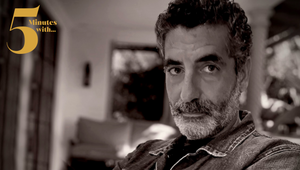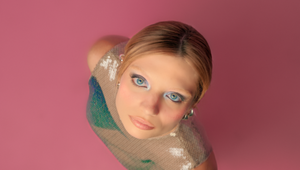
The Directors: Fred De Pontcharra

Reaching out to introduce Fred De Pontcharra, a French director who has recently signed to production company and LBB Member London Alley. Based in Paris, he brings a unique perspective as a former director of photography. Now with London Alley he's stepping into the role of filmmaker and producing work that is getting him noticed around the globe for his sensitivity to light, sound and energy. See HERE for Fred's recent projects including work for Puma, Lancome, and the French Tennis Federation.
LBB> What are some upcoming projects that you're excited about?
Fred> My next project is a music video for a new electronic label, 'Sublife.' I'm really excited about this because I rarely get to make videos without the artist on screen, and this was an opportunity to create a more fictional, scripted piece without relying on special effects. The novelty itself is what's truly thrilling.
Additionally, we set the story in the 1970s, against the backdrop of apartheid, and had the chance to film in Cape Town, which was a very moving experience.
LBB> What excites you in the advertising industry right now, as a director? Any trends or changes that open new opportunities?
Fred> What interests me in the industry now is that each project feels more personal. I feel that brand engagement, the need to stand out in a competitive field, and a time when people are flooded with visuals push projects to be more direct or even more innovative.
I also notice that agencies are increasingly involving directors earlier in the creative stages, which is refreshing—working on finalising scripts together, rather than compromising after the fact.
LBB> What elements of a script set one apart from the other, and what sort of scripts get you excited to shoot?
Fred> The scripts that excite me the most are those with a strong visual element. Manifestos, scripts with real effects and staging, backed by post-production—anything that brings a powerful energy. That’s where I feel most at home.
LBB> How do you approach creating a treatment for a spot?
Fred> It depends on the project, but generally, the structure is consistent. I put a lot of effort into breaking down the scenes and presenting a chronological vision so that the film's concept is as clear as possible and reflects my identity. I write it as if I’ve already secured the job, so if it comes through, a lot of the work is already done. I then describe the look and feel, supported by various references.
LBB> If the script is for a brand that you're not familiar with or a market you're new to, how important is it for you to do research and understand the strategic and contextual side of the ad?
Fred> I do the necessary research to understand the topic, but beyond that, I focus on the film itself. I trust the agency to handle the strategic side. The main things I pay attention to are the overarching guidelines of modern advertising: capturing the audience's attention in the first few seconds and being direct in the approach.
LBB> For you, what is the most important working relationship for a director to have with another person in making an ad? And why?
Fred> The producer and the creative director, because the stakes rest on the ideas and how to bring them to life. But honestly, every role is key in our industry. Even a good relationship and understanding with the marketing teams, for example, are essential to creating films in a healthier way.
LBB> What type of work are you most passionate about—is there a particular genre, subject matter, or style you are most drawn to?
Fred> I'm interested in anything that remains creative and realistic. I really like "vignette films"—films that require strong artistic direction, technicality, and a certain emotional touch.
LBB> What misconception about you or your work do you most often encounter, and why is it wrong?
Fred> People often think I'm too "urban" for some or too "fashion-oriented" for others. In the end, I’m often misjudged because people put me in boxes. But now it amuses me, and with experience, I think I’ve managed to diversify enough to build reels tailored to each different project.
I firmly believe that a director primarily has a narrative style and technical expertise, and can do car commercials or lifestyle just as well, as long as their style serves the film.
LBB> How do you strike the balance between being open/collaborative with the agency and brand client while also protecting the idea?
Fred> I try to be honest above all; I present ideas with rationale, but ultimately, it’s up to them to decide. After all, it’s advertising, and it’s their film. People often forget that we’re here to optimise and realise a vision. I think of us as architects—we propose visions, find solutions, but we won’t build a castle if the client wants a villa. We try to ensure a balance between good taste, efficiency, and creativity.
However, I always reserve some time to ensure additional shots and alternative versions, so that in editing, we can give the idea a second chance. Often, with the benefit of time and proof through images, we can preserve a lot of the initial creativity. Editing is a crucial stage in determining how much of the original idea we managed to save.
LBB> What are your thoughts on opening up the production world to a more diverse pool of talent? Are you open to mentoring and apprenticeships on set?
Fred> I think there’s no better school than a set. I’m always amazed by what people can produce with just their cell phones. So yes, I’m all for sharing.
LBB> What’s your relationship with new technology, and how do you incorporate future-facing tech into your work?
Fred> I think we should embrace what’s coming, master it, and use it as a creative tool. I use Midjourney a lot to create reference images and ChatGPT to organise ideas or working documents. The most important factor for me in the use of new technology is that the focus is always about elevating the visual ambition and craft.
LBB> Which pieces of your work do you feel showcase your strengths the best, and why?
Fred> I think of this Puma film, which helped me grow immensely. I believe I won the job because I immediately incorporated the empty CDG airport set into the treatment, which provided a realistic proposal for the production needs. It's technical, fun, and dynamic.
The Booba 6G music video, because I had the chance to showcase a more personal side of my work with a budget suited to the ambition, all in the amazing setting of Japan.
And finally, my most recent Casablanca film, although different, was developed with the same methodology as 6G. It involved significant creative freedom before filming and increased flexibility on set.















